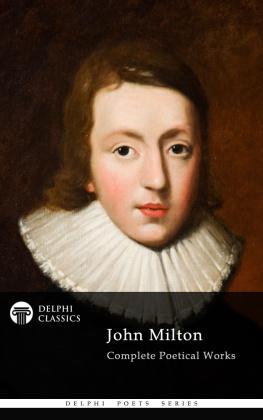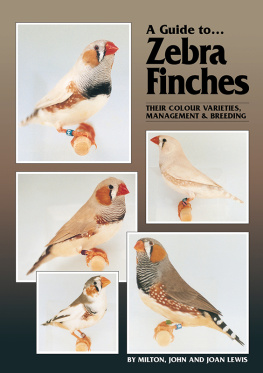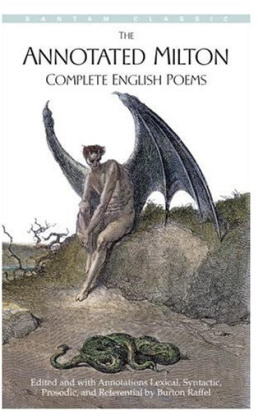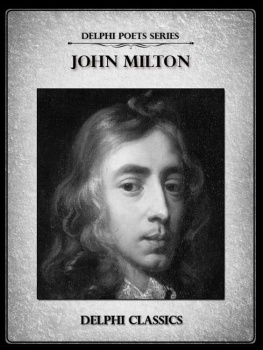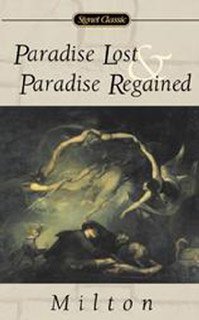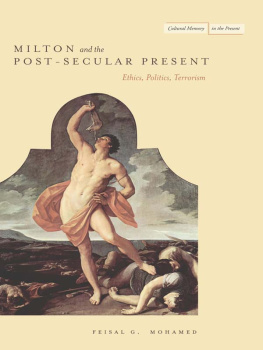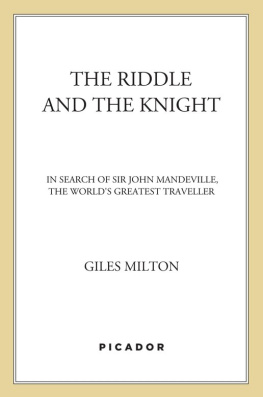John Milton - The Complete Poetry and Essential Prose of John Milton
Here you can read online John Milton - The Complete Poetry and Essential Prose of John Milton full text of the book (entire story) in english for free. Download pdf and epub, get meaning, cover and reviews about this ebook. year: 2009, publisher: Random House Publishing Group, genre: Detective and thriller. Description of the work, (preface) as well as reviews are available. Best literature library LitArk.com created for fans of good reading and offers a wide selection of genres:
Romance novel
Science fiction
Adventure
Detective
Science
History
Home and family
Prose
Art
Politics
Computer
Non-fiction
Religion
Business
Children
Humor
Choose a favorite category and find really read worthwhile books. Enjoy immersion in the world of imagination, feel the emotions of the characters or learn something new for yourself, make an fascinating discovery.

- Book:The Complete Poetry and Essential Prose of John Milton
- Author:
- Publisher:Random House Publishing Group
- Genre:
- Year:2009
- Rating:4 / 5
- Favourites:Add to favourites
- Your mark:
- 80
- 1
- 2
- 3
- 4
- 5
The Complete Poetry and Essential Prose of John Milton: summary, description and annotation
We offer to read an annotation, description, summary or preface (depends on what the author of the book "The Complete Poetry and Essential Prose of John Milton" wrote himself). If you haven't found the necessary information about the book — write in the comments, we will try to find it.
The Complete Poetry and Essential Prose of John Milton — read online for free the complete book (whole text) full work
Below is the text of the book, divided by pages. System saving the place of the last page read, allows you to conveniently read the book "The Complete Poetry and Essential Prose of John Milton" online for free, without having to search again every time where you left off. Put a bookmark, and you can go to the page where you finished reading at any time.
Font size:
Interval:
Bookmark:


2007 Modern Library Edition
Copyright 2007 by Random House, Inc.
All rights reserved.
Published in the United States by Modern Library, an imprint of The Random House Publishing Group, a division of Random House, Inc., New York.
M ODERN L IBRARY and the T ORCHBEARER Design are registered trademarks of Random House, Inc.
Grateful acknowledgment is made to Yale University Press for permission to reprint material from three volumes from The Complete Prose Works of John Milton edited by Maurice Kelley and John Carey: vol. 1 (copyright 1953 by Yale University), vol. 4 (copyright 1966 by Yale University), and volume 6 (copyright 1973 by Yale University). Reprinted by permission.
Illustration credits can be found on .
LIBRARY OF CONGRESS CATALOGING-IN-PUBLICATION DATA
Milton, John, 16081674.
[Selections. 2007]
The complete poetry and essential prose of John Milton/edited by
William Kerrigan, John Rumrich, and Stephen M. Fallon.
p. cm.
This edition contains all of Miltons poetry and a generous portion
of his most vital prose. The texts of both have been almost
entirely modernizedGeneral preface.
eISBN: 978-0-307-41948-4
I. Kerrigan, William II. Rumrich, John Peter
III. Fallon, Stephen M. IV. Title.
PR3553.K47 2007
821.4dc22 2007003087
www.modernlibrary.com
v3.1
- Clicking on the NOTES link at the beginning of each composition
- Clicking the numbered footnote links in the right column of each page
- Clicking the numbered link at the beginning of any footnote, which will take you back to your exact reading position.
- Clicking on the TOP link, which will take you to back to the beginning of the composition.
The Onslow portrait of Milton at age twenty-one, artist unknown. National Portrait Gallery, London.
Paradise Lost 4.25790. Paradise Lost. A Poem in Twelve Books 1674. Harry Ransom Humanities Research Center.
Portrait of Milton at age ten, by Cornelius Janssen. The Pierpont Morgan Library/Art Resource, N.Y.
Lycidas 12365. Facsimile of the Manuscript of Miltons Minor Poems, Preserved in the Library of Trinity College, Cambridge. Cambridge University Press, 1899. Harry Ransom Humanities Research Center.
Frontispiece portrait of John Milton, by William Marshall. Poems of Mr. John Milton, both English and Latin, Composd at Several Times 1645. Harry Ransom Humanities Research Center.
Frontispiece portrait of John Milton, by William Faithorne. The History of Britain 1670. Harry Ransom Humanities Research Center.
Paradise Lost title page. Paradise Lost. A Poem in Twelve Books 1674. Harry Ransom Humanities Research Center.
Fall of the Angels. The Caedmon Poems and Facsimiles of the Illustrations in the Junius Manuscript. E. P. Dutton & Co., 1916.
Satan on His Throne by John Martin. The Paradise Lost of John Milton. C. Whittingham, 1846. Harry Ransom Humanities Research Center.
Raphael Visits Adam and Eve by Gustave Dor. Miltons Paradise Lost. Illustrated by Gustave Dor. Cassell, Petter, Galpin & Co., 1882. Harry Ransom Humanities Research Center.
Expulsion of the Rebel Angels by Francis Hayman. Paradise Lost. A Poem in Twelve Books. J. and R. Tonson and S. Draper, 1749. Harry Ransom Humanities Research Center.
The Serpent Stands Before Eve by Edward Burney. Miltons Paradise Lost. C. Whittingham, 1800. Harry Ransom Humanities Research Center.
Aeropagitica title page. Areopagitica: A Speech of John Milton for the Liberty of Unlicencd Printing, to the Parlament of England 1644. Harry Ransom Humanities Research Center.
Frontispiece portrait of Charles I, by William Marshall. Eikon Basilike: The Pourtraicture of his Sacred Majestie in his Solitudes and Sufferings 1649. Harry Ransom Humanities Research Center.

Book IV, lines 257 to 290, from the second edition of Paradise Lost (1674).
This edition contains all of Miltons poetry and a generous portion of his most vital prose. Milton is among the greatest of authors. In preparing this edition, we have tried our level best to present and elucidate his writings in all their glorious detail. The texts of both poetry and prose have been almost entirely modernized. We have removed his italics, updated his spelling, dropped most of his capitalizations, revised his punctuation, and added quotation marks to the spoken and quoted passages. While there are obvious virtues in retaining the original presentation of these works, especially since Milton appears to have exerted at least some influence on many of the texts published in his lifetime, these benefits are outweighed, in our opinion, by the supreme benefit of making this difficult author as readable as possible for modern students. Old spelling texts are available online and in college and university libraries, indeed in many municipal libraries, and should a reader become particularly fascinated with a specific passage or work, we strongly recommend that these versions be consulted.
An important check on full-throttle modernization is a series of textual effects radiating from the fact that Milton was writing metrical verse in the seventeenth century. Take the example of elision. Milton freely indulged in this poetic convention. At will he was able to elide a syllable, making an entire iambic beat vanish. All he had to do was leave out a vowel, or replace a vowel with an apostrophe, in order to make a trisyllable such as opening into the bisyllabic opning. Our text retains significant elisions. We have been able to dispense with some few elisions because of changes in pronunciation. In the seventeenth century one could or could not pronounce the -ed suffix of past tense verbs. Milton, like other poets of the period, regularly indicated by orthography whether or not a particular -ed was to be voiced. In both the 1667 and 1674 editions of Paradise Lost a fallen Eve returns to Adam in Book 9 with the following words: Hast thou not wonderd, Adam, at my stay? (l. 856). As the spelling indicates, Milton intended the third syllable of wondered to remain silent. In modern English, however, there is no third syllable in wondered. It is only and always bisyllabic. A modernized edition can therefore safely print the line without indicating elision: Hast thou not wondered, Adam, at my stay? On the other hand, when an
Font size:
Interval:
Bookmark:
Similar books «The Complete Poetry and Essential Prose of John Milton»
Look at similar books to The Complete Poetry and Essential Prose of John Milton. We have selected literature similar in name and meaning in the hope of providing readers with more options to find new, interesting, not yet read works.
Discussion, reviews of the book The Complete Poetry and Essential Prose of John Milton and just readers' own opinions. Leave your comments, write what you think about the work, its meaning or the main characters. Specify what exactly you liked and what you didn't like, and why you think so.

